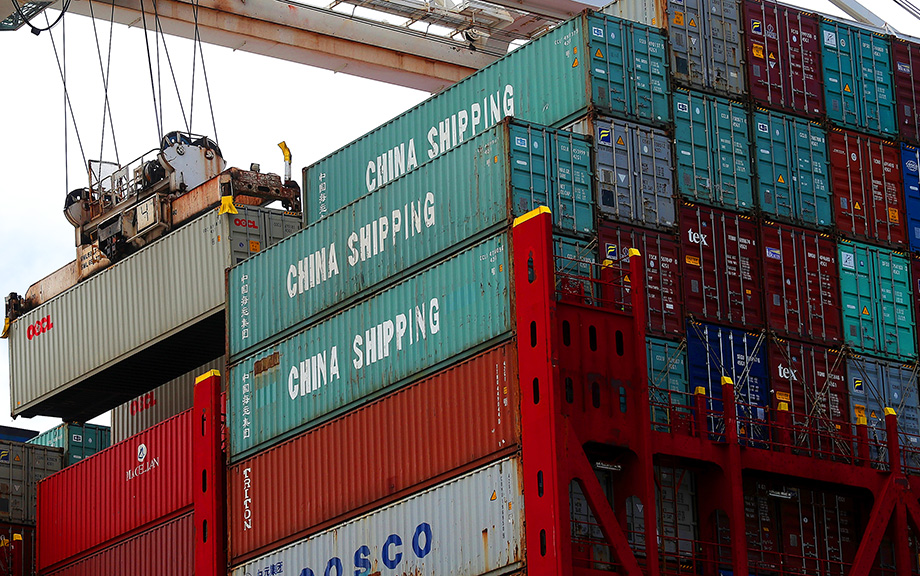Do Import Tariffs Protect U.S. Firms?

One key motivation for imposing tariffs on imported goods is to protect U.S. firms from foreign competition. By taxing imports, domestic prices become relatively cheaper, and Americans switch expenditure from foreign goods to domestic goods, thereby expanding the domestic industry. In a recent Liberty Street Economics post, we highlighted that our recent study found large aggregate losses to the U.S. from the U.S.-China trade war. Here, we delve into the cross-sectional patterns in search of segments of the economy that may have benefited from import protection. What we find, instead, is that most firms suffered large valuation losses on tariff-announcement days. We also document that these financial losses translated into future reductions in profits, employment, sales, and labor productivity.
Using Stock Returns to Assess the Aggregate Effect of the U.S.‑China Trade War

During 2018-19, the U.S. levied import tariffs of 10 to 50 percent on more than $300 billion of imports from China, and in response China retaliated with high tariffs of its own on U.S. exports. Estimating the aggregate impact of the trade war on the U.S. economy is challenging because tariffs can affect the economy through many different channels. In addition to changing relative prices, tariffs can impact productivity and economic uncertainty. Moreover, these effects can take years to become apparent in the data, and it is difficult to know what the future implications of a tariff are likely to be. In a recent paper, we argue that financial market data can be very useful in this context because market participants have strong incentives to carefully analyze the implications of a tariff announcement on firm profitability through various channels. We show that researchers can use movements in asset prices on days in which tariffs are announced to obtain estimates of market expectations of the present discounted value of firm cash flows, which then can be used to assess the welfare impact of tariffs. These estimates suggest that the trade war between the U.S. and China between 2018 and 2019 had a negative effect on the U.S. economy that is substantially larger than past estimates.
International Stock Markets’ Reactions to EU Climate Policy Shocks

While policies to combat climate change are designed to address a global problem, they are generally implemented at the national level. Nevertheless, the impact of domestic climate policies may spill over internationally given countries’ economic and financial interdependence. For example, a carbon tax charged to domestic firms for their use of fossil fuels may lead the firms to charge higher prices to their domestic and foreign customers; given the importance of global value chains in modern economies, the impact of that carbon tax may propagate across multiple layers of cross-border production linkages. In this post, we quantify the spillover effects of climate policies on forward-looking asset prices globally by estimating the impact of carbon price shocks in the European Union’s Emissions Trading System (EU ETS) on stock prices across a broad set of country-industry pairs. In other words, we measure how asset markets evaluate the impact of changes to the carbon price on growth and profitability prospects of the firms.
Leader‑Follower Dynamics in Shareholder Activism

Activist shareholders play a central role in modern corporations, influencing the capital structure, business strategy, and governance of firms. Such “blockholders” range from investors who actively jawbone or break up firms to index funds that are largely passive in that they limit themselves to voting. In between, however, is a key group of blockholders that have historically focused on trading but have embraced activism as an established business strategy in the past few decades. Campaigns involving such “trading” blockholders have become ubiquitous, increasingly targeting large-capitalization firms; further, their attacks feature multiple activists, each with individual stakes that, in isolation, are unable to control targets. In this post, we ask three questions: (1) How do trading activists build stakes before an attack, while anticipating that other investors may have similar incentives? (2) Does the nature of strategic trading change relative to settings where activism is unlikely to occur? (3) Are there trade-offs between trading and the firm’s long-term value?
The Overnight Drift in U.S. Equity Returns

Since the advent of electronic trading in the late 1990s, S&P 500 futures have traded close to 24 hours a day. In this post, which draws on our recent Staff Report, we document that holding U.S. equity futures overnight has earned a large positive return during the opening hours of European markets. The largest positive returns in the 1998–2019 sample have accrued between 2 a.m. and 3 a.m. U.S. Eastern time—the opening of European stock markets—and averaged 3.6 percent on an annualized basis, a phenomenon we call the overnight drift.
The International Spillover of U.S. Monetary Policy via Global Production Linkages

Julian di Giovanni describes work with Galina Hale that employs an empirical framework to quantify the role of the global production network in transmitting U.S. monetary policy across international stock markets.
What’s Up with Stocks?

“U.S. stocks are racing toward a second consecutive quarter of dramatic gains, continuing a historic stock-market recovery that few predicted in the depths of the March downturn,” said a September Wall Street Journal article. “The stock market is detached from economic reality. A reckoning is coming,” said the Washington Post. What is going on? In this post, I look not at what stocks have actually done or will do, but at what investors expected should have happened, and what they expect will happen going forward. It turns out that, at least by the particular measure of expectations I consider, investors expected stock returns to be high all along and continue to expect the same in the future.
Did Changes in Economic Expectations Foreshadow Swings in the 2018 Elections?

In our previous post, we looked at political polarization in economic expectations based on county-level results in the 2016 presidential election. In this post, we analyze how expectations leading up to and following the 2018 midterm elections evolved based on how districts voted in the House of Representatives elections. Do we see a similar post-election change in political polarization of beliefs when comparing congressional districts in which a Republican won in 2018 with those won by a Democrat? Were observed changes in expectations leading up to the 2018 elections systematically different in areas where the election resulted in a change in the party holding the House seat? We show that economic expectations deteriorated notably between the 2016 and 2018 elections in districts that switched from Republican to Democratic control, compared to districts that remained Republican.
The Indirect Costs of Lehman’s Bankruptcy

In our previous post, we assessed losses to customers and clients from foregone opportunities after Lehman Brothers filed for bankruptcy in September 2008. In this post, we examine losses to Lehman and its investors in anticipation of bankruptcy. For example, if bankruptcy is expected, Lehman’s earnings may decline as customers close their accounts or certain securities (such as derivatives) to which Lehman is a counterparty may lose value. We estimate these losses by analyzing Lehman’s earnings and stock, bond, and credit default swap (CDS) prices.
What Can We Learn from Prior Periods of Low Volatility?
Volatility, a measure of how much financial markets are fluctuating, has been near its record low in many asset classes.











 RSS Feed
RSS Feed Follow Liberty Street Economics
Follow Liberty Street Economics